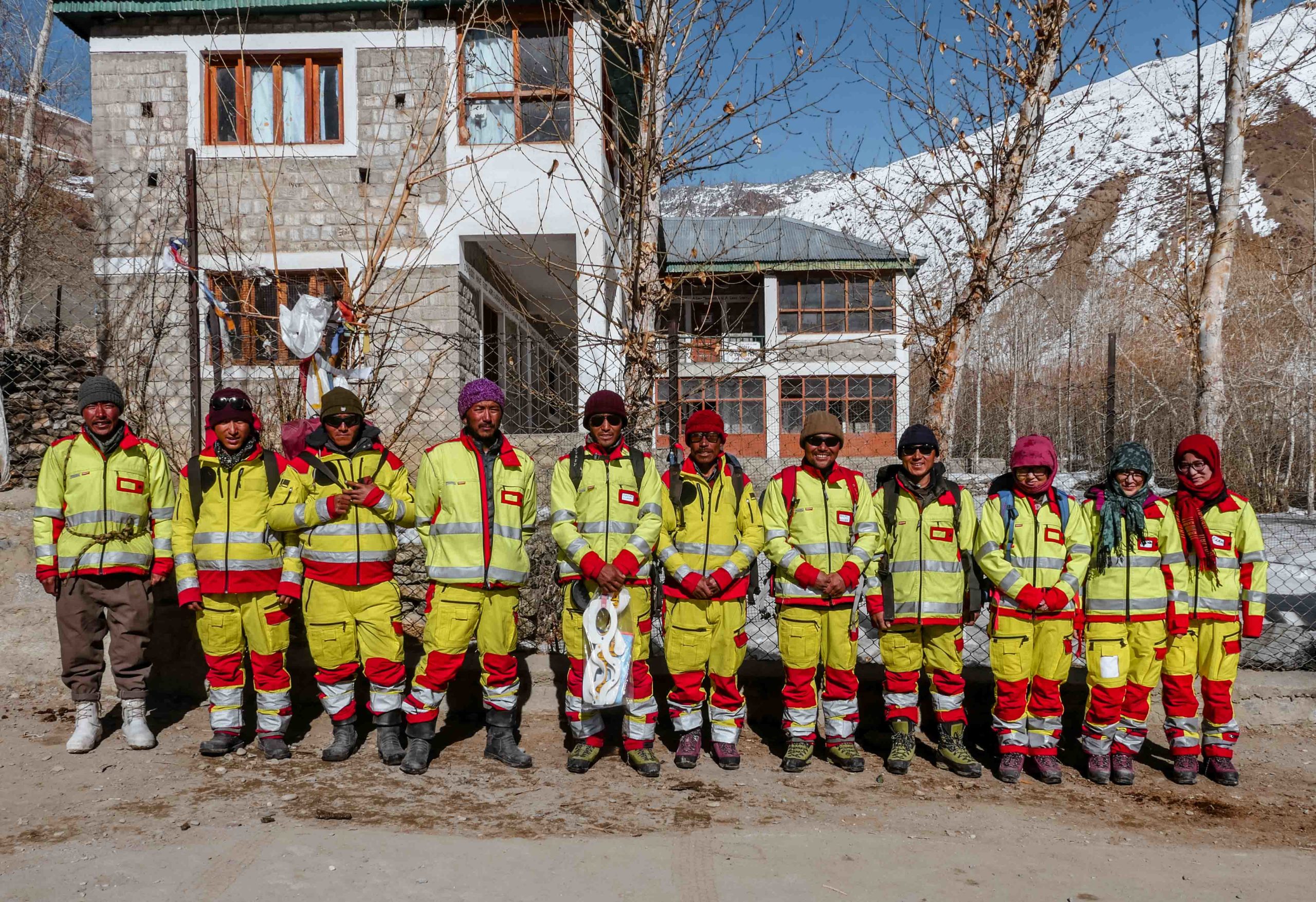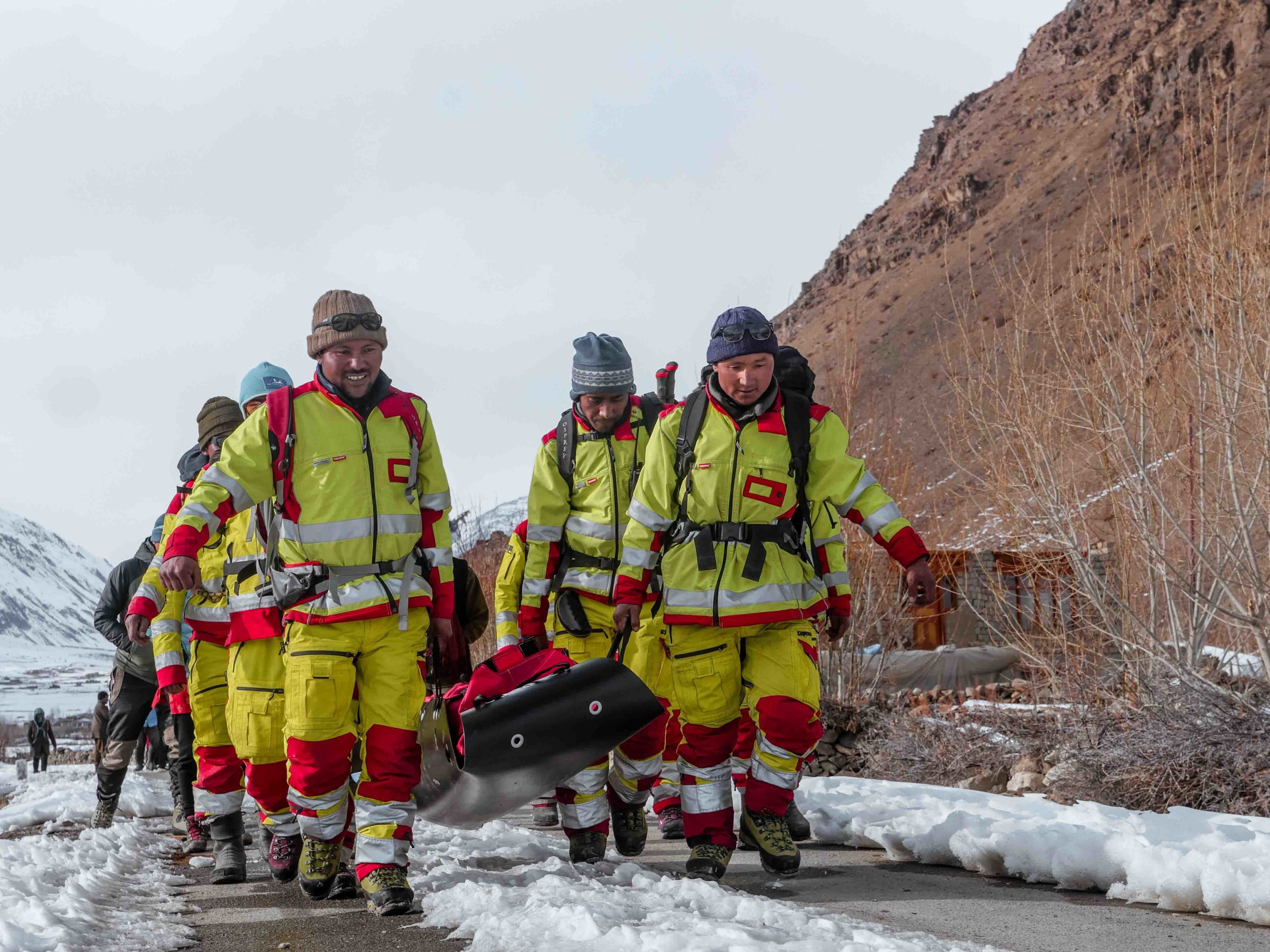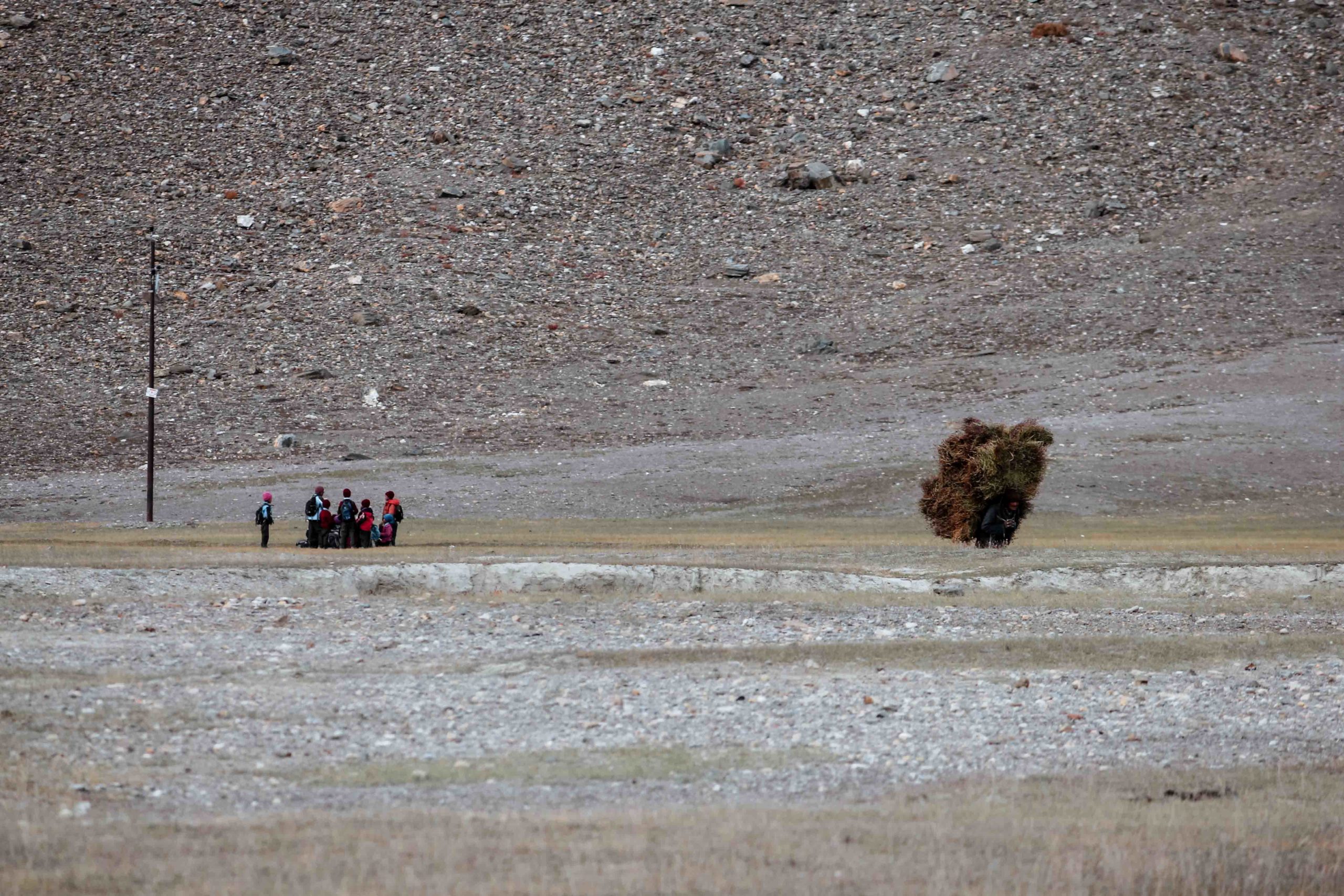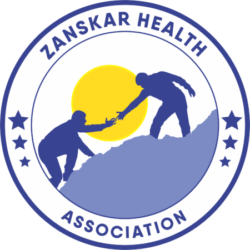Zanskar Rescue Team
After a full day of discussion about the health problems in winter at the 2nd Zanskar Health Conference came the idea to build the Zanskar Rescue Team in the fall of 2016. The objective was to help the villagers of Tungri to set up a land-based rescue team to enable safe transport of patients to the hospital of Padum (the only one in Zanskar), especially when all roads are blocked by snow. Eight strong and motivated Zanskari youths expressed their motivation to become the first rescue team in Zanskar.


Objectives of the project
-
- Train all team members in winter mountaineering; rescue techniques: Snowshoeing and basic mountaineering techniques, avalanche risk knowledge and rescue
- Teach basic skills in rescue medicine
- Teach safe patient transport with a patient rescue sled
- Ensure a free rescue service for the population
- Ensure a payroll for the rescue team staff
- Ensure annual continuous training for the rescue team, on the long term peer-training
- Enable a reliable communication system in winter
January & February 2018 : Launching of the project and 1st Training and ZRT
Members of Zanskar Rescue Team launching in 2018
- 4 technical rescuing staff
- Padma Sonam, male, 32 years old, Tungri village, driver
- Thuckjay Angchuk, male, 38 years old, Tungri village, carpenter
- Thuckjay Tahan, male, 39 years old, Tungri village, farmer
- Stanzin Phunchok, male, 35 years old, Tungri village, driver
- 4 men from Ralakung village joined spontaneously the team
- 4 medical rescuing staff
- Stanzin Dolma, female, 25 years old, Tungri village, nurse student (last year)
- Pedma Lamo, female 27 years old, Tungri village (nurse)
- Stanzin Naskit, female 27 years old, Tungri village (nurse)
- Tashi Dorjay, male, 45 years old, Rantakshar village (next to Tungri) (amchi, traditional medicine)
Equipment
- high-quality winter clothing
- snow shoes, avalanche rescue material
- Essential medicines and basic medical disposals
- Rescue equipment (patient stretcher, causality bag)
- Basic mountaineering equipment (rope, harness, crampons, ice axe etc.)
- Walkie-Talkies (satellite phones are strictly prohibited in the region)
Training experts
- Steve Long, mountain guide, Chairman, UIAA Training Panel, United Kingdom
- Elisabeth Marth, Gynaecologist – Obstetrician, Innsbruck Austria
- Christophe Huehn, general and emergency physician, Geneva, Switzerland
- Jean-Luc Magnenat, internal medicine and pneumology, Geneva, Switzerland
- Eloïse Magnenat, assistant doctor internal medicine, Biel
- Amalie Frandsen, assistant doctor internal medicine, Biel
Organizing team
- Rebecca Hertzog, assistant doctor internal medicine, Altdorf
Yeshi Dorjay, trekking guide Zanskar
These professionals provided the training to the Zanskari team on a voluntary basis and during their spare time.
August 2018 : 2nd Technical training of the ZRT
Objectives of the second training:
- revise skills learned during the first teaching session
- add additional skills after ascertaining the existing level of skills retention
Participants of the training:
- 4 technical rescuing staff of the Tungri Team: Padma Sonam, Thuckjay Angchuk, Thuckjay Tahan, Stanzin Phunchok
New equipment:
- same as 01/2018
Who were the training experts?
- Steve Long, mountain guide, Chairman, UIAA Training Panel, United Kingdom
- Manfred Meusburger, Lech Rescue Team Leader (Austria),
- Raphael Meier, Lech Rescue Team, Austria
- Marcel Ziegler, Lech Rescue Team, Austria
These professionals provided the training to the Zanskari team on a voluntary basis and during their spare time.
Conclusion
- The expert team could realize that the local rescue team practised the skills regularly since the last teaching.
- They could train stretcher handling in moderately difficult terrain, scenarios requiring rope work for security and additional « winter skills » were trained on the glacier in Rantik Tokpo basecamp above Tungri village.
- The trainers were impressed by the commitment shown by the ZRT and recommended them to involve a junior team of « trainees » in order to provide physical assistance in case of emergency and to pave the way for the next « generation » of rescue team members.
- Co-training of other teams and skills refresh
Perspective
- Trainees : two young men of Tungri have been integrated
Interventions of the ZRT in 2018
- The Ralagun Team had one summer rescue intervention. The patient had to be transported on a horse. They managed to bring him on time to Padum hospital and the patient survived. We don’t know the exact details about the health problem the patient had.
- The Tungri Team also brought one patient by car to the hospital because the nurses and amchi could not help him sufficiently in the dispensary. He had an acute urinary retention.
- The amchi and nurses have daily 3-10 patients that they treat in the medical aid centre in Tungri
- The rescue team of Tungri went collecting and processed medicinal plants with the amchi and two men from Tungri travelled to Dharamsala in order to buy additional amchi medicine. They have enough amchi medicine for the whole winter. This shows the commitment of the community to their local medical system and to our project.
June 2019 : 3rd Technical training of the ZRT
Objectives of the third training
- revise skills learned during the two first teaching session
- add additional skills after ascertaining the existing level of skills retention
Participants of the training
- Tungri Team: Padma Sonam, Thuckjay Angchuk, Thuckjay Tahan, Stanzin Phunchok
- Ralakung Team (4 members)
- Stanzin Tsephel (as one of the two first female rescuers in Zanskar !)
New equipment
- 2nd rescue stretcher
- new rope
- “culottes de sauvetage”
Training experts:
- Manfred Meusburger, Lech Rescue Team Leader, Austria
- Markus Amann, Deputy Leader of Helicopter Rescue Bergrettung Vorarlberg, Austria
- Franz Josef Schmutzer, Operation Leader Bergrettung Lech, Austria
- Daniel Walch, Rescuer Bergrettung Lech, Austria
- Steve Long, mountain guide, Chairman, UIAA Training Panel, United Kingdom
These professionals provided the training to the Zanskari team on a voluntary basis and during their spare time.
Conclusion
- training was a real success and was on the same time as the training of the mountain rescuers of Leh who participated at mountain leadership course as well
- The teams worked very independently and we got much further than we thought.
- The training included basics like knots and how to prepare a patient for transport to advanced rescue techniques. Also included was basic snow knowledge and avalanche training.
- Part of the Zanskar team did not bring there personal equipment to the training have a inventory which includes
- strecher issue
- have a sommer stretcher with wheel (priority one)
- one for snow (priority two)
To do / Perspective
- have a inventory of the team equipment and personal equipment
- Location (Tungri, Ralakung) and general equipment like stretchers, ropes etc.
- Name of rescuers and their personal equipment (helmet, harness, slings…)
- assign one of the team responsible for the equipment
- ev. Stretcher sponsoring
- The Zanskar Rescue Team will be always welcome to future training. It would be great if one or two from Ladakh can participate the medical training in Tungri in september 2019
New in 2019: Arrival of the ambulance
Thanks to a generous sponsor our rescue team could purchase a jeep that was customized as “ambulance”, allowing much faster transport and also transport of lying patients. The jeep model is particularly robust and has even the capacity to drive in the snow. Next to rescue interventions the ambulance has been used to purchase medicine, helped in building the ice stupa, enabled the home visits for amchi and nurse care and conduct awareness campaigns on health issues.
Interventions in 2019
Here are e few examples of interventions:
- The ZRT could transport a woman with placenta retention with the sled to Padum. She has been further airlifted by helicopter to Leh. The baby and mother are fine. The rescue has been challenging, especially if we consider the transport of a new born baby during winter. Based on their recent experiences under heavy snowfalls, the team would like to be able to use a sled that is sliding more smoothly in deep snow and on longer distances. This has been reviewed with our technical experts and the decision has been taken to provide a new sled for those conditions (Akja Sled by Tyromont).
- A man fell from the roof of the house while cleaning the snow, he was transferred to Padum hospital
- An older ill monk from Karsha monastery has been taken to hospital in Padum
- A woman slipped in the snow and injured her knee; she got primary care from the dispensary nurses and was referred to Padum hospital for further care
- Even in the remote village of Raru (Lungnak region), the ZRT could pick up a critically ill patient after a huge effort of clearing their way through the snow
- A delivery patient was taken to Padum hospital
2020 and 2021
Due to the pandemic situation with the coronavirus, travel was not possible so that we could not conduct any teaching session in Ladakh. Nevertheless our local team continued to regularly train the learned skills and were on call in case of emergency.
We plan, if possible, a next teaching session in Ladakh in June 2022 with this time going to the next step of peer-training to enable sustainability in the project.

